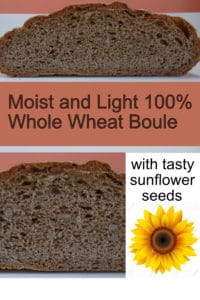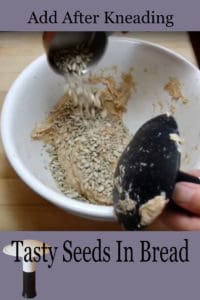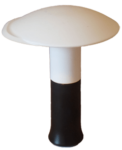Whole wheat artisan bread is pretty simple and requires very little work. It’s packed with whole grain nourishment and the sunflower seeds add lots more protein for even more nutritional value. Homemade whole wheat bread doesn’t have to be baked in a loaf pan. This simple whole wheat bread is a boule that can be shaped in your hands and baked on any kind of baking pan. You can make this bread without a banneton and without a dutch oven or a baking cloche. It can be prepared and baked in as little as 3½ hours or it can be prepared then left to proof at room temperature for longer, if that fits your schedule better. It’s a very moist dough so the final boule is light and delicious, yet it’s a whole wheat crusty bread made from 100% whole wheat flour. Watch my Video demonstration of this whole wheat boule recipe.
 Autolyse
Autolyse
Making wheat bread starts with an autolyse – the process in which you mix the flour and water together and allow the mixture to sit for 15 or 20 minutes while the gluten activates. This step is so simple and it helps bread rise better because the gluten has a chance to start building a good structure. By the way, I’ve tested whether salt and yeast interfere with this process and I haven’t found that they do to any noticeable degree. So when I autolyse, I add all the ingredients to the water, blend well and then stir in the flour. If you don’t have a scale to measure the flour, be sure to watch my video demonstration of this recipe to see and note the optimal consistency for this dough. Add more water or more flour if needed.
Very Little Kneading
After that, only a little kneading is necessary to create good dough strength by stretching and aligning the gluten into elastic sheets. This is all the preparation you need to do. If you use the Dome, just smear the dough on the bottom of the bowl by pushing and dragging the dough. Do this for about 20 strokes or about a minute. This will give the dough a good structure. But that’s all you need to do. See below if you want to add seeds to the dough. You autolyse, knead, and allow the yeast to multiply and the dough to proof. Two sessions of stretching & folding during proofing will give the boule more height, but you can leave these steps out if the timing doesn’t work out for you (however, your loaf will spread out a little more and have less height.) Then you can shape it into a ball of dough and create tension on the top surface as described below to create a classic artisan wheat bread.
 Seeds in Bread Dough
Seeds in Bread Dough
If you want to add seeds to your boule, pour the seeds onto the spread out kneaded dough. Then stir the dough with the Dome. Alternate stirring motions with pushing motions. This will spread the seeds throughout the dough. The dough will rise and proof with the seeds in place.
Ingredients
15 oz of water (1¾ cups + 1 tbs.)
.11 oz of yeast (1 tsp)
.30 oz of salt (1½ tsp)
.20 oz of molasses (1 tsp)
.7 oz of oil (1 tbs & 1 tsp)
16 oz of whole wheat flour (3 1/3 cups)
½ cup of sunflower seeds (optional)
Directions:
1. Add the water, yeast, salt , molasses and oil to a mixing bowl. Stir it well until dissolved.
2. Stir in the flour until consistently wet. Scrape in all the flour that clings to the bowl.
3. Autolyse by allowing the mixture to sit for 15 to 20 minutes.
4. Knead by spreading the dough against the bottom of the bowl to stretch and align the gluten. Using the dome will make this easier, plus it has its own bowl scraping edge. Turn the bowl so the kneading is done in all directions. Do about a dozen strokes.
5. Now is the time to add the seeds if you want to include them. Work the seeds in evenly.
6. Cover the dough with plastic wrap or a beeswax cover to keep the dough from forming a skin.
6. After at least 45 minutes of proofing you can stretch & fold the dough. You can do this right in the bowl. Take a section of dough, stretch the dough upward and fold it over itself. You can leave it to proof for much longer too, if that’s more convenient.
7. Cover it again and proof for at least another 30 minutes. Then do another round of stretching & folding.
8. To shape the dough, scrape the dough onto a floured surface, dust your hands with flour and begin to shape it into a ball. To do this, spread the dough out a little, then take a section of dough and fold it over toward the center. Then working in a circle, take another section and fold it over toward the center, continuing until a ball is formed.
9. Create tension on the top surface of the dough ball to help it maintain a good shape. You hold the dough ball in your hands and gently pull the surface dough underneath to stretch and tighten the top. This tension makes the surface dough stronger to hold a good boule shape.
10. Take a cookie sheet or other shallow baking pan and dust it with a ten inch circle of cornmeal, oatmeal or bran, or place some parchment paper on it. Place the dough ball top side up on the cornmeal, etc. to rise until doubled in volume. This will take about an hour and a half in a 68° – 70°F room.
10. When you sense the dough is close to double the volume, preheat the oven to 400° F.
11. Bake the loaf at 400° F for about 45 minutes until golden brown.
12. Cool a couple of hours before cutting the loaf.
Watch my Video demonstration of this recipe.
Subscribe to this blog for more delicious recipes and videos
Learn more about the Dome Dough Maker

